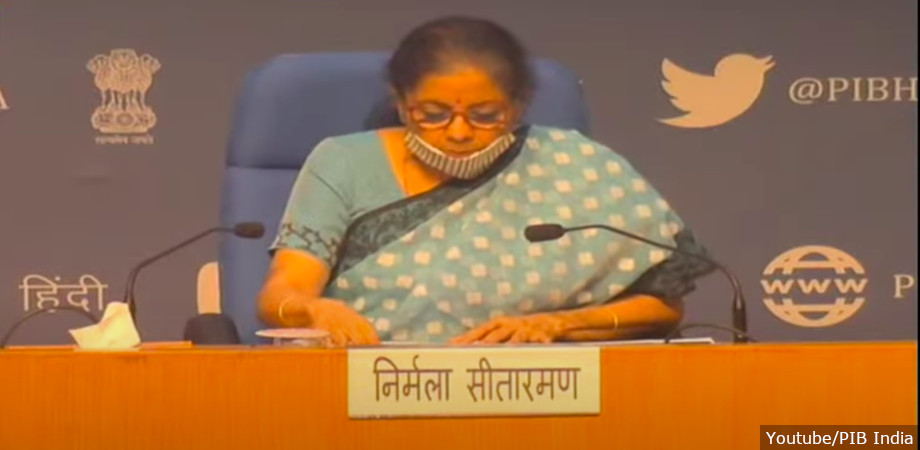Before MSME ‘Fund Of Funds’, A Rs60,000Cr Fund For Startups Disbursed 6% Of Target

Jaipur and New Delhi: The government will invest Rs 10,000 crore to create a ‘Fund of Funds’ for equity investment into micro, small and medium enterprises (MSME), Finance Minister Nirmala Sitharaman announced on May 13, 2020, as part of the government’s economic package for COVID-19-affected businesses.
The ‘mother fund’--the government’s contribution--would be 20%, and the remaining 80% would be invested by ‘daughter’ funds. “It is expected that with leverage of 1:4 at the level of daughter funds, the Fund of Funds will be able to mobilise equity of about Rs 50,000 crores,” a government statement said. This means other investors would put in Rs 40,000 crore.
The government had announced a similar fund for start-ups as part of the Start-up India Action Plan in 2016. “A corpus of Rs 10,000 crore could potentially be the nucleus for catalysing Rs 60,000 crore of equity investment and twice as much debt investment,” the government had said at the time. “This would provide a stable and predictable source of funding for start-up enterprises and thereby facilitate large-scale job creation.”
That fund has raised a corpus of Rs 25,728 crore, according to a government press release from March 11, 2020. But, in five years, Alternate Investment Funds (AIF) have invested just Rs 3,582 crore into 338 startups. Of this, Rs 912.9 crore--25% of the total investment till date and 9% of the Rs 10,000 crore committed in 2016--was from the government’s Fund of Funds, according to information from the website of the Small Industries Development Bank of India (SIDBI). The Fund of Funds is managed by SIDBI, which invests the money into Alternate Investment Funds, which in turn invest in start-ups.
“I apprehend that there will be similar implications of this [MSME] fund as of the start-up Funds of Funds,” said H.P. Kumar, ex-chairperson and managing director of the National Small Industries Corporation (NSIC).
On April 15, 2020, Nitin Gadkari, the MSME minister, had said that a Rs 10,000 crore fund was in the works to buy 15% equity in MSMEs with high credit ratings who want to list on the stock market, according to this Press Trust of India report. The fund would be managed by NSIC or another government body.
Until now, the government has not officially released any details on how the proposed MSME Fund of Funds will be run or what kinds of companies it would invest in.
“The government’s intention is good. They want to help SMEs raise money from the capital market,” but the way the fund is operationalised, the investment will be dictated by the private sector, Kumar explained. This is because the government is only putting in Rs 10,000 of the Rs 50,000 crore, which means that the private sector will have its own rules for investing such as background checks, investing only in prospects that they think will give the highest returns, etc. The money may not reach the intended beneficiaries and it would have worked better if the government had directly put the money into companies, he said.
Arun Panda, former secretary of MSME, disagreed. “This is an excellent idea… This is a new beginning,” he told IndiaSpend. He had worked on the Fund of Funds before his superannuation in April 2020. The new fund is meant for viable MSMEs with a lot of potential--500 are even listed on the exchange--he explained. “It is also a way of reducing the dependence of MSMEs on debt, and getting them handholding and advice from investors, he added.
“The details have not come out yet and we would need more details to be able to comment on this,” said Amit Bharadwaj, the secretary general of the Federation of Indian Micro and Small & Medium Enterprises, an industry body.
More information is needed on whether start-ups would also qualify for this, who would be the fund manager, whether it is a one-time fund, etc., said Sandeep Bisht, national spokesperson for the Chamber of Startups, Industries and Entrepreneurs (India) Council. “If it is the same set-up as the previous Fund of Funds, it will remain a paper scheme,” he said.
IndiaSpend emailed questions to several MSME officials, including the additional secretary and development commissioner, the additional development commissioner and the deputy director general. The office of Santanu Mitra, additional development commissioner, asked us to talk to Piyush Srivastava, another additional development commissioner, who in turn asked us to talk to the deputy director O.P. Singh. Singh did not comment on the Fund of Funds. We will update the story once we receive a response.
The idea of such a fund can be traced back to 2012-13, when it was laid out as part of the National Innovation Council’s strategy to encourage commercially viable small and medium enterprises to pursue innovations that drive social change.
In 2013, the MSME ministry proposed a much smaller, Rs 500-crore “India Inclusive Innovation Fund” for enterprises developing solutions for citizens in the “lower half of India’s economic pyramid, with limited physical and institutional access to basic services”.
Of this Rs 500 crore, the government was to contribute Rs 100 crore, according to this press release from 2013. The rest would be given by banks, insurance companies, overseas financial and development institutions, another press release from 2014 said. “The Fund’s eventual aim is to expand the corpus to Rs 5,000 crores over the next 24 months,” the release added. No money was disbursed from this fund and that government’s tenure ended in 2014.
(Khaitan is a writer/editor with IndiaSpend and FactChecker.in. Bharadwaj, an undergraduate at Yale University, is an intern with IndiaSpend and FactChecker.in.)
We welcome feedback. Please write to respond@indiaspend.org. We reserve the right to edit responses for language and grammar.


